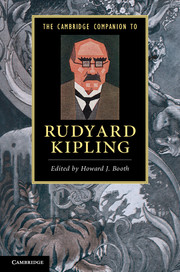Book contents
- Frontmatter
- Introduction
- 1 Kipling and the fin-de-siécle
- 2 India and empire
- 3 Kipling’s very special relationship: Kipling in America, America in Kipling
- 4 Science and technology
- 5 Kipling and gender
- 6 Kipling and war
- 7 Kipling as a children's writer and the Jungle Books
- 8 'Nine and sixty ways’: Kipling, ventriloquist poet
- 9 Kim
- 10 The later short fiction
- 11 Kipling and postcolonial literature
- 12 Kipling and the visual: illustrations and adaptations
- 13 Reading Kipling in India
- Further reading
- Index
3 - Kipling’s very special relationship: Kipling in America, America in Kipling
Published online by Cambridge University Press: 28 September 2011
- Frontmatter
- Introduction
- 1 Kipling and the fin-de-siécle
- 2 India and empire
- 3 Kipling’s very special relationship: Kipling in America, America in Kipling
- 4 Science and technology
- 5 Kipling and gender
- 6 Kipling and war
- 7 Kipling as a children's writer and the Jungle Books
- 8 'Nine and sixty ways’: Kipling, ventriloquist poet
- 9 Kim
- 10 The later short fiction
- 11 Kipling and postcolonial literature
- 12 Kipling and the visual: illustrations and adaptations
- 13 Reading Kipling in India
- Further reading
- Index
Summary
Let there be no misunderstanding about the matter. I love this people and if any contemptuous criticism has to be done I will do it myself. My heart has gone out to them beyond all other peoples.
It is evident, even notorious, that Kipling was committed to an Anglo-American 'special relationship' long before Winston Churchill coined the term. No work of Rudyard Kipling's is more celebrated or imperative than 'The White Man's Burden' (1899), that injunction to the US to assume imperial power in the Philippines. The most cursory reader recognises Kipling's demands for Anglo-Saxon solidarity between the great English-speaking nations. But for all the political clarity of Kipling's international demands on the US, he had a more complex relation to the country, a bonding that emerged from his life as a Vermont householder. If Kipling had lots of clear opinions, he also harboured deeply confused feelings. The clarity made him a famous polemicist but the feelings made him an American writer.
The American ark: home at Naulakha
The newly married Caroline and Rudyard Kipling built the house called ‘Naulakha’ in 1892–3 on a hillside in Dummerston, Vermont, overlooking the Connecticut River Valley and facing Mount Wantastiquet. The name meant their ‘Jewel Beyond Price’, their ‘Treasure’ and betokened ‘ The House’ to be happy in. For a few years they were happier than ever again in their lives. After they left Naulakha because of an explosive family feud with Carrie’ s brother Beatty, they never again inhabited so comfortable a house or enjoyed such family happiness.
- Type
- Chapter
- Information
- The Cambridge Companion to Rudyard Kipling , pp. 37 - 51Publisher: Cambridge University PressPrint publication year: 2011
- 3
- Cited by



